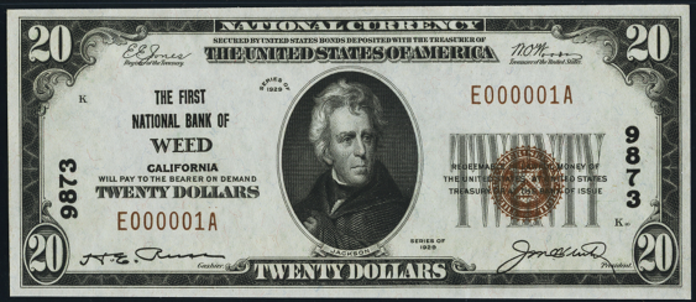Twenty Dollar Notes › Nationals › 1929 Twenty Dollar National Bank Notes › South Dakota Charters › 1929 $20 Philip South Dakota First National Bank
Get Value Now
| Item | Info |
|---|---|
| Series | 1929 |
| Charter | #13430 First National Bank of Philip, South Dakota |
| Year Chartered | 1930, 104 Banks Chartered |
| City Info | Philip is a city in Haakon County, South Dakota, United States. The population was 779 at the 2010 census. It is the county seat of Haakon County. Philip was laid out in 1907 when the Chicago and North Western Railway was extended to that point. It was incorporated in 1908. In 1914, Philip was designated seat of the newly formed Haakon County. The city was named for James "Scotty" Philip; the local high school mascot is the Scotch terrier, or "Scottie", in his honor. Source: Wikipedia |
| Similar Cities | If your note doesn't match try: 1. Philipsburg, Montana - First National Bank 2. Philipsburg, Montana - Merchants and Miners National Bank 3. Philippi, West Virginia - First National Bank 4. Philippi, West Virginia - Citizens National Bank 5. Philippi, West Virginia - First National Bank |
| Seal Varieties | Small Brown |
| See Also | If your note doesn't match try: 1. 1929 $20 Federal Reserve Bank Note 2. 1928 $20 Federal Reserve Note 3. 1928A $20 Federal Reserve Note 4. 1928B $20 Federal Reserve Note 5. 1928C $20 Federal Reserve Note 6. 1934 $20 Federal Reserve Note |
| Other Info | 1. Value depends on notes known for charter, condition and market demand. |
| Neat Fact | Check your note's serial number. Serial #1 notes are valuable, even on common charters. Serial numbers 2-4 are also desirable in some cases. |
No Obligations Offers and Appraisals
Please submit a good photo or scan. It will be identified and evaluated. Understand there may be subtle differences between the image you see above and your note. Signatures, design, markings and note condition will determine the offer price. Notes in Uncirculated or better condition receive the best offers.
Appraisals can be estimated for wholesale and retail prices. Wholesale is what dealers typically pay. Retail is what a collector might pay. Retail is slightly higher in most cases.
Please visit this page for USA Paper Money Reference. Do not treat this page as a reference guide, it is for appraisal and acquisition purposes only.
